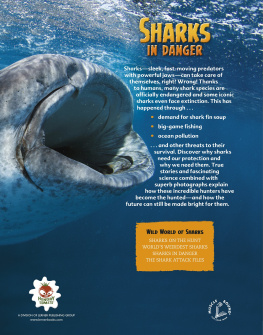

For more than forty years, Yearling has been the leading name in classic and award-winning literature for young readers.Yearling books feature children's favorite authors and characters, providing dynamic stories of adventure, humor, history, mystery, and fantasy.Trust Yearling paperbacks to entertain, inspire, and promote the love of reading in all children. OTHER YEARLING BOOKS YOU WILL ENJOY BORN TO FLY, Shane Osborn with Malcolm McConnell BASHER FIVE-TWO, Captain Scott O'Grady with Michael French THE TIME HACKERS, Gary Paulsen JACK BLACK AND THE SHIP OF THIEVES, Carol Hughes ISABEL OF THE WHALES, Hester Velmans NICKY DEUCE: WELCOME TO THE FAMILY
Steve Schirripa and Charles Fleming OPERATION: DUMP THE CHUMP, Barbara Park THE FIVE ANCESTORS: TIGER, Jeff Stone THE WRECKERS, Iain Lawrence

For Christopher
great traveler, diver, and boon companion
CONTENTS
Preface Aliens in the Sea Shark attacks are natural news leaders. They are the perfect showstopping spectacle: blood and guts, horror ( ANIMAL SAVAGES HUMAN !), and mystery ( INVISIBLE TERROR FROM THE DEEP !), and they are highly videogenic. Even if the camera can't get a shot of shark or victim, it can pan the empty beach and the forbidding ocean, focus on the BEACH CLOSED or DANGER: SHARKS signs, and capture the comments of panicky witnesses.Shark attacks often dominate the news in the summer. Newspapers, magazines, radio and television news, and talk shows keep count of the incidents of supposed carnage. Experts speculate on the causes and meanings of this assault on humanity.The truth is that the hysteria is not justified by statistics or other facts. Though shark attacks seemed to occur more frequently as the twentieth century went on, thanks to increases in the numbers of people living by the shore and swimming in the water and to vastly improved communications, they leveled off during the 1990s. Sixty to eighty attacks are reported worldwide each year.Shark attacks continue to occur. But in the United States homicides or fatal accidents at work are ten times more frequent. And motor-vehicle deaths are over a thousand times more common than shark attacks. As for shark-attack fatalities, well, they're so rare that they're not even on the scale.I have a lunchpail degree in sharks. What I know about them I've learned not from books so much as on the jobor in the water. All my life I have been fascinated by sharks and have spent more than three decades studying, diving with, and writing about them. I've made documentary films about them and been involved in the feature films and television movies made from my novels about sharks, including Jaws, The Deep, and Beast .I've swum with sharks of all species, sizes, and temperaments all over the world, from Australia to Bermuda, South Africa to San Diego, almost always on purpose but sometimes by accident. I've been threatened but never attacked, bumped and shoved but never bitten, andmany times frightened out of my flippers.Over the years I've learned how to swim, snorkel, and dive safely in the ocean. I've learned how to existcoexist, reallywith sharks and the hundreds of other marine animals I've been lucky enough to encounter. That's why I've written this book about sharks and other sea creatures, and about understanding how to be safe in the ocean.In these pages, I pass along what I've learned about sharks and how to minimize the chances of getting in trouble with them. I also describe how to maximize the chances of seeing sharks, something that is becoming harder and harder to do.Shark attacks on human beings generate a tremendous amount of media coverage. That's partly because they occur so rarely. But it's also because people are, and always have been, both intrigued and terrified by sharks. Sharks come from one part of the dark castle where our nightmares live the deep water beyond our sight and understanding. So they stimulate our fears and our fantasies.For some of us, the fear is a safe feara fear of something that is unlikely ever to happen to us.But for those of us who spend much of our lives in, on, or under the sea, it is a genuine fear, one to be dealt with using knowledge, experience, and judgment.Of all the shark statistics, one that is almost totally ignored by the media and the public is the most horrible of all: for every human being killed by a shark, roughly ten million sharks are killed by humans. Sometimes they're killed for their skins and their meat. But mostly they're killed for their fins, which are made into soup that is sold for as much as a hundred dollars a bowl all over the world. Shark fin soup is regarded as a delicacy in China and other Asian nations.Sharks are critical to the ocean's natural balance in ways we know and in ways we are still discovering. Wiping them out, through greed, recklessness, or simple ignorance, would be a tragedynot just a moral tragedy, but an environmental one as well.For all we read and hear about unprovoked shark attacks, I've come to believe that there's no such thing. We provoke sharks every time we enter the water where they happen to be, for we forget: the ocean is not our territory, it's theirs.None of us would stroll casually into the Amazon jungle wearing nothing but a bathing suit and carrying a tube of sun cream and a can of bug spray for protection. We know that the jungle is not our natural habitat. We realize we're intruders in the jungle, where many creatures regard us as a threat or as prey. Those creatures will use every mechanism nature has given themsting, bite, poison, whateverto ward us off or attack us.In short, we give the jungle the respect it deserves.Yet many people regard the ocean casually and don't think about its dangers. Humans need to recognize that we represent a tiny minority on our planet. Seventy percent of the earth is covered by water, leaving to us a mere three square miles out of every ten.Of our planet's biomass (the grand total of all living things), more than 80 percent inhabits the seas and oceans. All of those creatures have to eat, from the tiniest cope-pod to the largest carnivorous fish in the world: the great white shark.And so, when we plunge into the water, we must be aware that we are the aliens. We must heed the signs that a shark could be patrolling nearbysigns such as birds working a school of baitfish just offshore, fishermen in small boats with rods bent double and the surface of the water oily with a slick of chum, and other warning signs I'll describe in these pages. We need to realize that when we go into the sea, we are entering hostile territory. We should take at least the basic precautions, knowing that we are fair game to the predators that live there.I don't mean for a moment that we should stay out of the sea. But we need to prepare ourselves to swim safely in it.We cannot survive without healthy seas. The sea sustains all life on earth, controlling our climate and atmosphere, generating the air we breathe and the water we drink. Yet only now are we beginning to realize that we have the power to destroy it. For centuries, human beings have treated the sea as an infinite resource and a bottomless dump. Now we are learning that the sea, like everything else on the earth, is finite and fragile.This book is about understanding the sea in all its beauty, mystery, and power. It is about respecting the sea and its creatures, many of which are exotic, complex, and more intriguing than anything ever imagined by the mind of man.But mostly, it is about sharks and my experiences with them. Sharks are perfect predators whose form and function have not changed significantly in more than thirty million years. I'll try to pass on what I've learned about sharks and about keeping safe in the sea. I'll try to show you what sharks are like and why they don't want to hurt you or eat you. In fact, sharks would like nothing better than to be left alone to do what nature has programmed them to do: swim, eat, and make little sharks.
Next page











 For more than forty years, Yearling has been the leading name in classic and award-winning literature for young readers.Yearling books feature children's favorite authors and characters, providing dynamic stories of adventure, humor, history, mystery, and fantasy.Trust Yearling paperbacks to entertain, inspire, and promote the love of reading in all children. OTHER YEARLING BOOKS YOU WILL ENJOY BORN TO FLY, Shane Osborn with Malcolm McConnell BASHER FIVE-TWO, Captain Scott O'Grady with Michael French THE TIME HACKERS, Gary Paulsen JACK BLACK AND THE SHIP OF THIEVES, Carol Hughes ISABEL OF THE WHALES, Hester Velmans NICKY DEUCE: WELCOME TO THE FAMILY
For more than forty years, Yearling has been the leading name in classic and award-winning literature for young readers.Yearling books feature children's favorite authors and characters, providing dynamic stories of adventure, humor, history, mystery, and fantasy.Trust Yearling paperbacks to entertain, inspire, and promote the love of reading in all children. OTHER YEARLING BOOKS YOU WILL ENJOY BORN TO FLY, Shane Osborn with Malcolm McConnell BASHER FIVE-TWO, Captain Scott O'Grady with Michael French THE TIME HACKERS, Gary Paulsen JACK BLACK AND THE SHIP OF THIEVES, Carol Hughes ISABEL OF THE WHALES, Hester Velmans NICKY DEUCE: WELCOME TO THE FAMILY